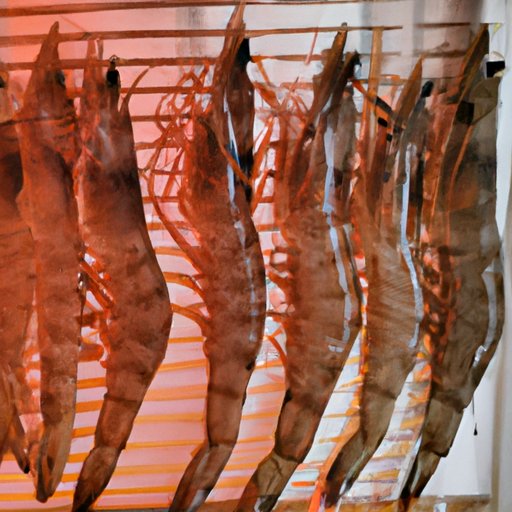Introduction
Shrimp is a popular seafood choice for many households, but with its delicate texture and flavor, it’s important to know how to store it properly. From the proper temperature to the type of packaging, understanding how to store shrimp in the refrigerator is essential for keeping it fresh and flavorful. This article will explore how long shrimp can stay in the refrigerator, as well as tips for making the most of your shrimp.
How to Store Shrimp: The Ideal Refrigerator Conditions for Maximum Freshness
When it comes to optimal refrigeration conditions, there are three main factors to consider: temperature, humidity, and packaging. Keeping these elements in check will help extend the shelf-life of your shrimp.
Temperature
The ideal temperature for refrigerating shrimp is between 32°F and 40°F (0°C and 4.5°C). Any lower than this, and the shrimp may freeze; any higher, and they may spoil too quickly.
Humidity
Shrimp should be stored in a humid environment to maintain their moisture. If the air in your refrigerator is too dry, wrap the shrimp in a damp cloth or paper towel before storing it in an air-tight container.
Packaging
Shrimp should always be stored in an air-tight container or zip-top bag. This will prevent them from drying out and will also help keep other foods from cross-contaminating the shrimp.
How Long Can You Keep Shrimp in the Fridge?
When stored properly, cooked shrimp can last up to three days in the refrigerator. Raw shrimp, however, can last up to five days if stored in the coldest part of the fridge. It’s important to note that the shelf life of shrimp depends on several factors, including the type of shrimp, how it was prepared, and how it was stored.
Do’s and Don’ts of Refrigerating Shrimp
There are certain steps you can take to ensure your shrimp stays fresh for as long as possible. Here are some important do’s and don’ts of refrigerating shrimp:
Do:
-
Properly clean the shrimp before storing.
-
Use an air-tight container to store the shrimp.
-
Store in the coldest part of the refrigerator.
Don’t:
-
Leave out at room temperature.
-
Cross-contaminate with raw foods.

Prolonging Shelf Life: Tips on Keeping Shrimp Fresh
In addition to following the above guidelines for refrigerating shrimp, there are a few other tips to keep in mind when storing shrimp. These include:
Clean Thoroughly
Before storing shrimp, make sure to clean it properly. Use a brush to remove any dirt or debris, then rinse with cold water. This will help preserve the flavor and texture of the shrimp.
Use Cold Water
When rinsing the shrimp, make sure to use cold water. Hot water can cause the shrimp to become mushy and lose its flavor.
Place in an Airtight Container
Once the shrimp is clean, place it in an airtight container. This will help keep the shrimp fresh and prevent it from spoiling.

What You Should Know About Storing Shrimp in the Fridge
When storing shrimp in the refrigerator, there are a few things to keep in mind. First, make sure the refrigerator is set to the correct temperature. Too low, and the shrimp may freeze; too high, and it may spoil too quickly. Additionally, avoid freezing shrimp. Freezing shrimp can cause it to become tough and rubbery.
Maximizing Freshness: Refrigerating Shrimp
By following the above guidelines for optimal refrigerator conditions, you can extend the shelf-life of your shrimp and keep it fresh for longer. To maximize freshness, make sure to keep the shrimp in the coldest part of the refrigerator and store it in an airtight container. Additionally, try to cook the shrimp as soon as possible after purchasing it.

Making the Most of Your Shrimp: Refrigeration Tips
To get the most out of your shrimp, it’s important to store it properly. Here are some additional tips to keep in mind when refrigerating shrimp:
Cook Right Away
If you’re planning to cook the shrimp, try to do so as soon as possible. The sooner you cook the shrimp, the fresher it will be.
Refreeze Cooked Shrimp
If you’re not planning to eat the cooked shrimp right away, you can refreeze it for up to two months. However, keep in mind that it may not taste as good as freshly cooked shrimp.
Conclusion
By following the above guidelines, you can extend the shelf-life of your shrimp and keep it fresh for longer. Make sure to store the shrimp in the coldest part of the refrigerator, use an airtight container, and cook it as soon as possible. By doing so, you can maximize the freshness of your shrimp and enjoy its delicious flavor.


